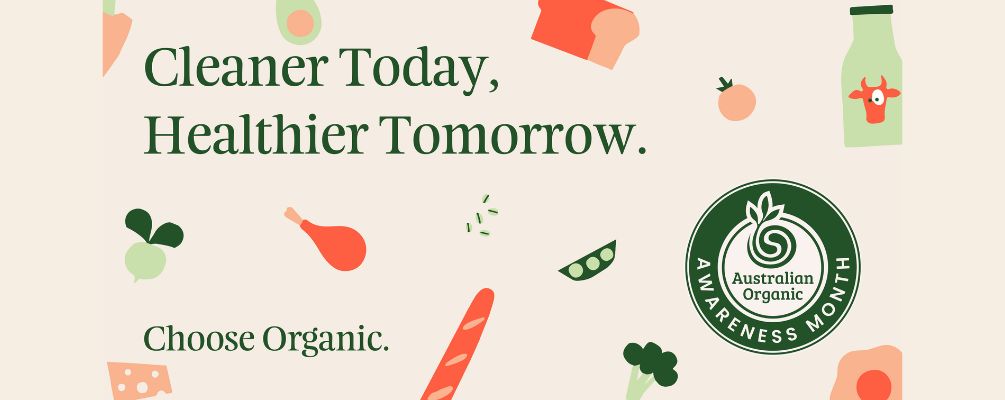Here at Honest to Goodness, we believe in wholesome living that sustains both people and the planet. We want to make healthy living simple, sustainable & accessible. Learn how choosing organic can support your health as well as the environment.
Join us in celebrating certified Organic!
September is all about raising awareness of certified organic products, brands and businesses by educating consumers about why choosing certified organic is so important, and encouraging them to look for organic certification logos on their purchases.
What is Certified Organic?
In Australia, certified organic always means:
- Sustainable and regenerative;
- Synthetic herbicide, pesticide and chemical free;
- Free range and no artificial additives or hormones;
- All GMOs are prohibited.
While anyone can claim their product is organic, a certifying logo is your proof that the product you are buying not only talks the talk but walks the walk.
To be certified organic, farmers must undergo audits over 3 years and continue to be audited to hold onto the organic certification. The audits are to ensure the growing and manufacturing process is up to Australia’s organic standards and the 3-year period is to ensure full organic compliance.
Honest to Goodness is a certified organic company and all organic products sold by us are 3rd party verified by the ACO. The ACO is the largest and most trusted certifier for organic and biodynamic produce in Australia, taking 3 years to become certified.
All of our organic products are sourced and handled under strict ACO guidelines, ensuring their organic integrity remains intact. Being certified organic also means that the Honest to Goodness warehouse and production facility are never fumigated, and we continue to have yearly audits to maintain our certification.
Taste the difference with our organic range and eat your way to change.
How is organic food better?
Tossing up between organic and non-organic products? Not sure why organic products are more expensive? Here are a few reasons why you should shop organic!
There are no harmful pesticides used: the only ones that are used come from natural pesticides. This means no residue on the food you are eating and the farmers are not exposed to constant chemicals - and neither is the earth! Whereas conventional agriculture uses fungicides, herbicides and synthetic pesticides. No matter how many times the food is washed, a residue of these chemicals remains on the food.
It's more nutritious: studies have shown that organic food contains more vitamins, minerals and micronutrients than conventionally grown food.
There are no artificial additives: organic produce has no artificial ingredients, chemical flavourings, MSG or preservatives (including sulphur dioxide).
It tastes better: the careful organic farming practices that emphasise quality over quantity, the better welfare of animals and the lack of any filler ingredients allow the natural flavours of the food to shine through.

How does organic farming benefit the environment?
Organic food isn’t just better for your health, it is also better for the environment! Organic farming practices:
Prevents the use of toxic chemicals. The chemicals used in conventional agriculture can be damaging to our environment, wildlife and health. Our climate is changing at a rapid rate. Eating organic and supporting organic farming can help slow climate change by allowing nature to rebalance itself after all the altering we have forced it to do over the years through conventional farming.
Build healthy soil. Healthy soil is the basis for organic agriculture. Organic farmers use natural resources to maintain healthy soil that can sustain generations. Because the soil has no nasties in it, your food will in turn have all the nutrients it is supposed to have.
Encourage biodiversity. Organic farms respect the natural biodiversity of their environment, creating stable habitats for local wildlife and increasing how resilient a farm is to issues like bad weather, disease and pests.
Reduces pollutants in water health. When pesticides and fertilizers are used, damaging runoff can end up in our waterways. This runoff not only affects us but the environment and animals as well.

Look for a certification logo
Consumers cannot be guaranteed that a product is organic unless it displays an organic certification logo such as the Australian Certified Organic ‘Bud’ logo. An organic certification logo protects consumers from misleading claims and is the mark of a genuine organic product that has been audited all along the production chain, from paddock to plate, to comply with strict organic standards.
When buying products that display the Australian Certified Organic ‘Bud’, consumers are guaranteed their purchase is the real deal. An item displaying the ‘Bud’ has been produced with the health and welfare of consumers, animals and the environment in mind. The Australian Certified Organic ‘Bud’ trademark logo is Australia’s most recognised organic certification mark and appears on thousands of certified organic products. Remember to look for the Bud!
References
Worthington, V. (2001). Nutritional Quality of Organic Versus Conventional Fruits, Vegetables, and Grains. The Journal Of Alternative And Complementary Medicine, 7(2), 161-173. doi: 10.1089/107555301750164244








